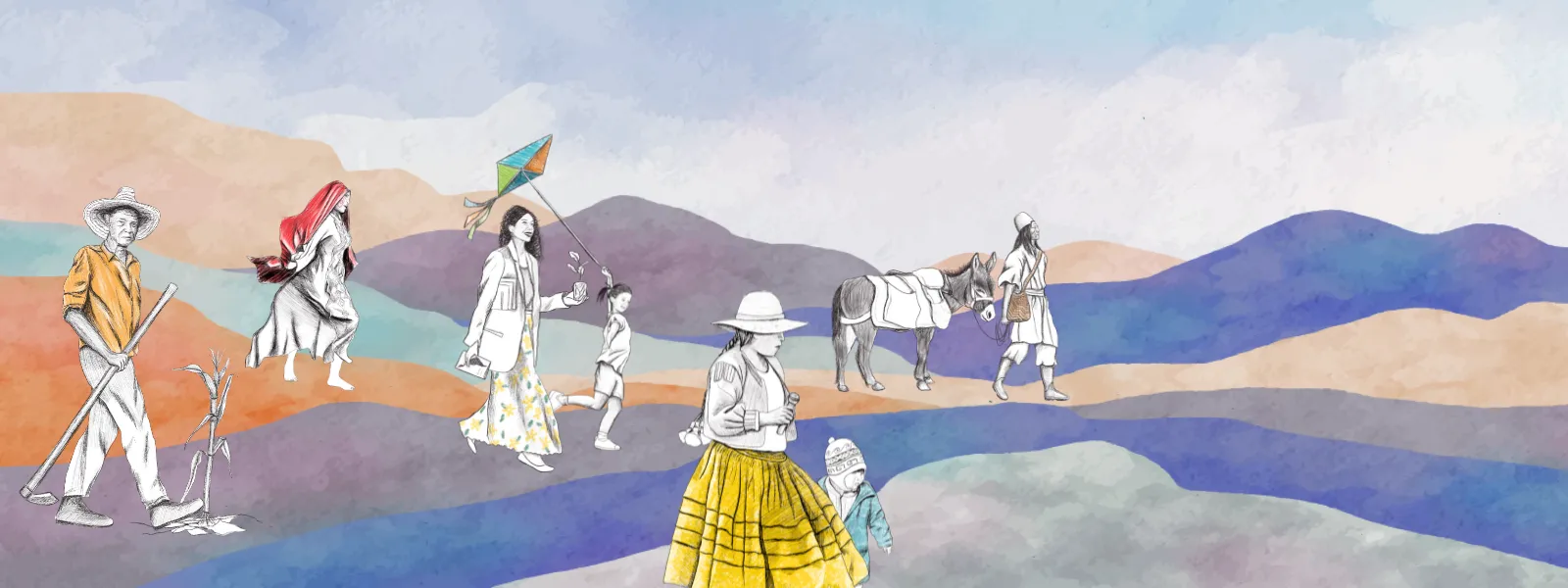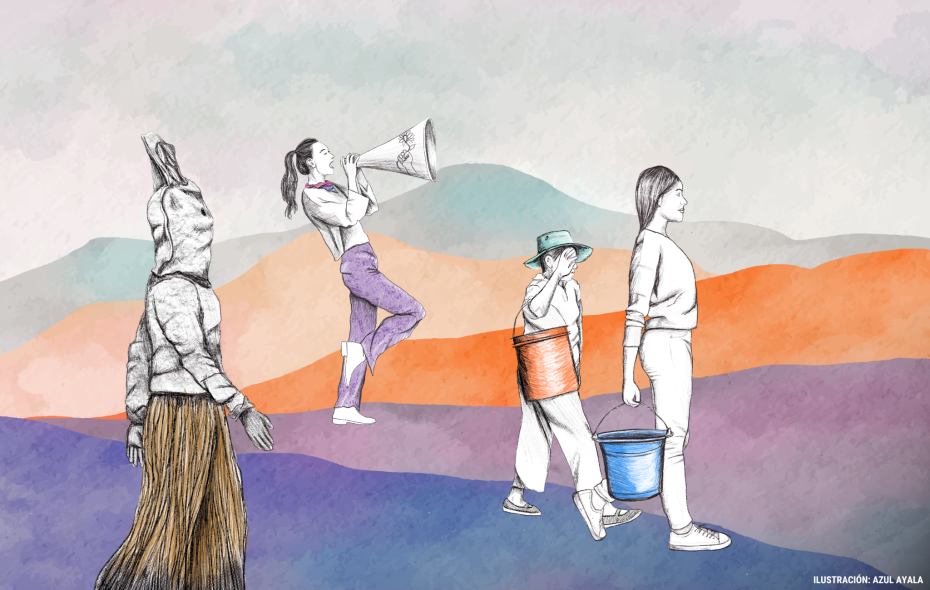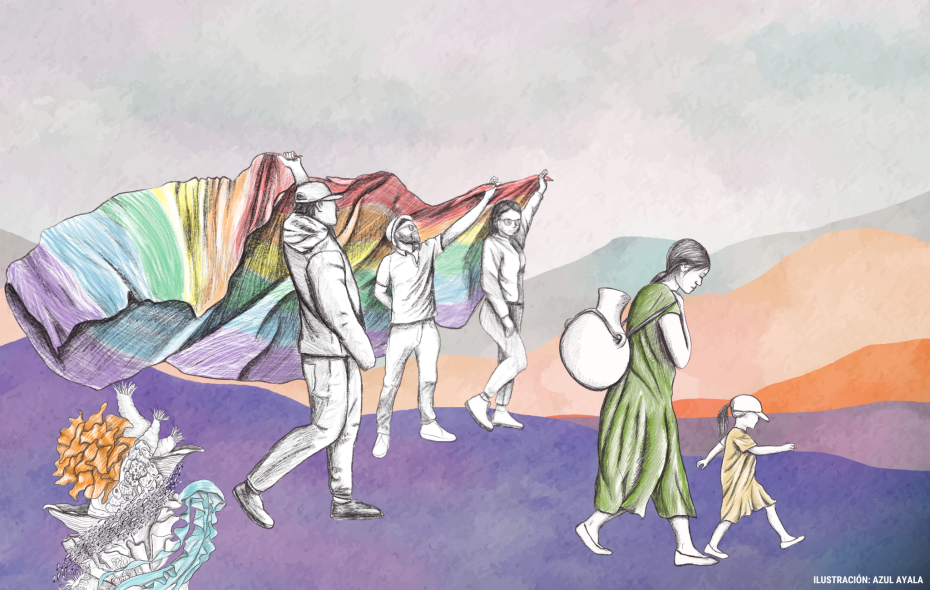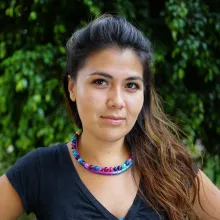
Communities bring their voice on the climate crisis before the Inter-American Court
Ilustration: Azul Ayala.By Liliana Ávila and Marcella Ribeiro*
The hearing was held May 25 to 29 in Manaus, Brazil's largest Amazon city, where the mighty Amazon River is born when the dark waters of the Negro River meet the lighter waters of the Solimões.
A delegation of seven communities and a network of trans and non-binary people from different corners of the continent arrived there to tell the Inter-American Court of Human Rights where they come from, what territory and habitat they occupy, how the climate crisis and environmental injustice affect their way of life, and what they propose so that the international court can help guarantee their rights in the face of the global crisis and actions to combat it.
As in Bridgetown, Barbados, a month earlier, Manaus was the venue for the public hearings of the Advisory Opinion on Climate Emergency and Human Rights, an opinion in which the Court will clarify the obligations of the hemisphere's states to protect people, especially those in vulnerable situations, from the effects of the climate crisis.
The voices from the territories
Oral hearings are part of the process by which the Court delivers its advisory opinions. In these hearings, the judges of the Court listen to States and other actors in interventions that should not exceed 10 minutes.

The history of peoples and their struggles do not fit into 10 minutes. Nevertheless, the testimonies of each member of the delegation were full of wisdom, dignity and hope.
Francis Cruz, representative of the Honduran Climate Change Alliance and resident of the community of Marcovia, told how the sea destroyed his house and restaurant, everything he had. Coastal erosion has taken away more than 12 meters of land in his community, which depends on fishing and tourism. In fact, the community and others in the southern part of the country live with the constant threat of meteorological events whose intensity and frequency are linked to climate change and the environmental degradation it causes.
The Court also learned that the extraction of hydrocarbons through fracking in the province of Mendoza, Argentina, is limiting the resilience of Mapuche communities in the face of the climate crisis and is exacerbating the serious situation of water scarcity in the area. This was explained by Gabriel Jofré, spokesperson for the Malalweche Territorial Identity Organization, who highlighted the traditional knowledge of the Mapuche people as a source of answers to their situation of climate vulnerability.
In her testimony, Katta Alonso, spokesperson for the territorial movement MUZOSARE (Mujeres de Zona de Sacrificio en Resistencia), described what it is like to live in Quintero and Puchuncaví, Chile, a highly polluted place that has been transformed forever into an industrial complex of thermoelectric, oil and chemical plants, where energy conversion projects are exacerbating the problem. "Climate change affects us because it affects everyone, but even more because we are already in a situation of environmental vulnerability. We are also affected by the policies and measures that the government adopts in its attempts to deal with the climate crisis, because they are sacrificing us again. Once again, they are offering our territories for the installation of harmful industries that will supposedly solve the problem. There is no information, no participation, no possibility of defense," she said.
On behalf of Mujeres Unidas en Defensa del Agua: Lago Titicaca Perú-Bolivia, María Eugenia Millares spoke about the contamination of the lake and how temperature changes affect planting, food production cycles and food preservation. She highlighted the role of women: "Our capacity to adapt is diminishing as we lose our livelihoods due to the climate crisis and the failure of the state. But we know that we can change this situation. We women, who are the most affected because we use the water for household and other activities, must be heard and recognized for our role in saving the lake and its life."
Angelica Ortiz, representing the communities of La Gran Parada and El Rocío - located in the department of La Guajira, Colombia - and the organization Wayuu Women's Forces, also spoke at the hearing. She highlighted the reality of the Wayuu indigenous people, whose ability to adapt to the climate emergency has been diminished in a situation of economic vulnerability, water crisis, decades of coal exploitation and, more recently, wind energy projects being developed in their territories without consulting them. "We don't know when it will rain, so we don't know when to plant.”
The Court also heard the case of the four indigenous communities of the Sierra Nevada de Santa Marta, an ecosystem that has lost more than 90 percent of its glaciers due to global warming. "Our mother is sick, the climate crisis is the disease that we have caused to the mother, and that is the message we are receiving today," said Jaime Luis Arias, Cabildo Governor of the Kankuamo people. Among other things, the climate crisis threatens the ancestral knowledge system of these peoples, their traditional practices and their spiritual life.
Finally, Yoko Ruiz, Territorial Coordinator of the Trans Health League, spoke about the differentiated impacts of the climate crisis on women, girls and LGBTIQ+ people. She urged that the Court's decision to clarify state obligations to protect human rights in the face of climate emergency be consistent with the realities of discrimination and structural violence faced by these populations.
Contributing from experience and wisdom
The members of the delegation came to Manaus not only to talk about the problems they face. As agents of change, they also brought concrete proposals on how to urgently address the climate crisis, based on their knowledge and experience, and respecting human rights.

Their proposals are a cry of hope that they wish to be heard by the Court. They are a call to rethink the structural causes of the natural and spiritual imbalance; and to stop the affronts to Mother Earth, her sacred elements, organs and vital systems.
Among many other things, they suggested to:
- Establish a declaration of integral protection for ethnic and rural territories and ecosystems that are highly vulnerable to the climate crisis.
- Strengthen the adaptive capacity of populations through ancestral knowledge, community monitoring and other mechanisms that ensure the climate resilience of their inhabitants.
- Recognize the validity of ancestral knowledge and urge states to strengthen the capacity of populations to monitor and care for ecosystems as a means of promoting climate adaptation.
- Ensure that plans for prevention, preparedness, response, recovery and adaptation to climate disasters include a gender perspective and guarantee services and inputs related to health in general and the sexual and reproductive health of women, girls and LGBTQ+ people.
The convening of the peoples of the Americas to prepare for the Advisory Opinion of the Inter-American Court is more than a formality and a 10-minute presentation. It is above all a bet on hope, an affirmation that the fight against the climate crisis will be with and for the peoples, or not at all.
AIDA supported various communities in the region to bring their voices to the process by participating in the hearings in Bridgetown and Manaus, and by submitting legal briefs to the Court highlighting the multiple socio-environmental impacts of the climate emergency and valuable proposals to address them.
This experience reflects our commitment to build ethical, collective and horizontal processes together with Latin American communities to strengthen the reach of their voices and promote the renewal of international law based on their knowledge.
For our team, it is essential to be a bridge between defenders who fight for life every day. We seek to change the traditionally exclusionary logic of international decision-making spaces, promoting the exchange of diverse knowledge and working to ensure that decisions about nature include the voice of those who truly protect it and live in harmony with it.
*Liliana Ávila is the Director of AIDA's Human Rights and Environment Program; Marcella Ribeiro is a senior attorney with the program.
Liliana Ávila

Liliana A. Ávila is the Director of AIDA's Human Rights and Environment Program. A Colombian, she works from the Bogotá office. Liliana is an attorney from the Universidad Externado de Colombia, a specialist in constitutional law, and holds a Masters in Legal Argumentation from the University of Alicante in Spain. She has experience in international human rights law and international systems for the protection of human rights. She's a professor of international law at the Universidad Externado and has worked as a legal advisor on human rights, international humanitarian law, and public health.
